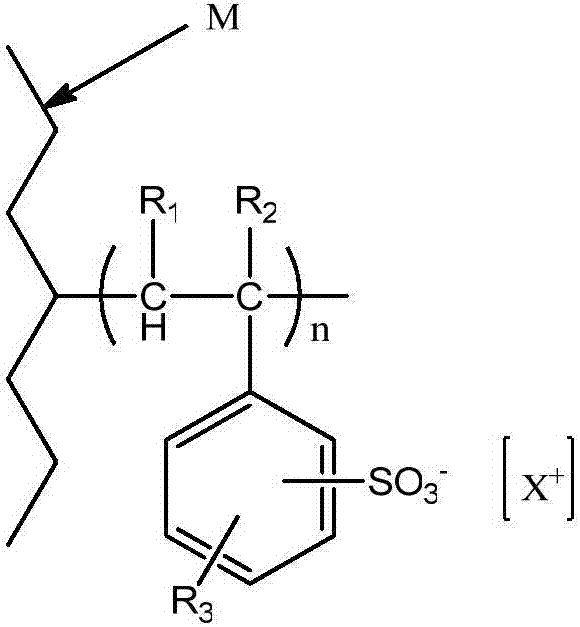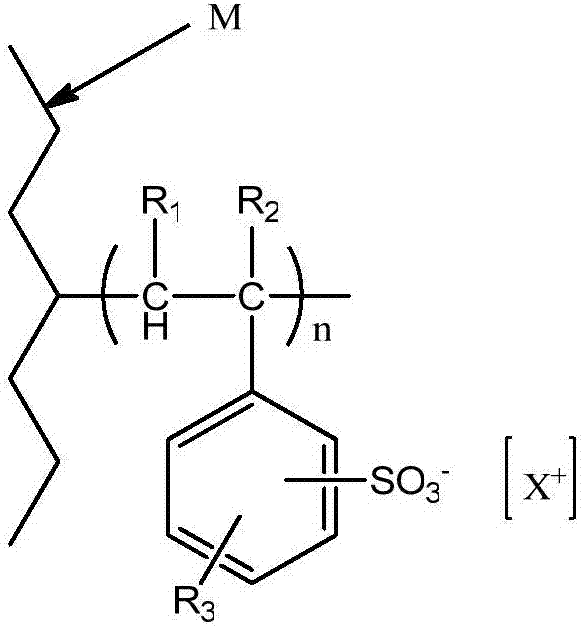Homogenous phase cation exchange membrane and preparation method thereof
A cation exchange membrane and film-forming technology, applied in the field of homogeneous cation exchange membrane and its preparation, can solve the problems of poor oxidation resistance, high fuel permeability, high price, etc., and achieve good thermal stability and chemical stability. , The steps are simple, the effect of reducing the harm to the human body and the environment
- Summary
- Abstract
- Description
- Claims
- Application Information
AI Technical Summary
Problems solved by technology
Method used
Image
Examples
Embodiment 1
[0052] (1) After cleaning the basement film (polyethylene film), put it in a vacuum drying oven and dry it to constant weight, then put the basement film into an irradiation bottle, and put it into a cobalt source irradiation chamber to irradiate to a total dose of 30kGy .
[0053] (2) The membrane after irradiation is placed in the reactor, soak the membrane in the toluene solution of 30% styrene, feed nitrogen to get rid of the air in the reactor, then seal it, and put the reactor at a constant temperature of 60°C The reaction was carried out in a water bath for 2 hours, so that the membrane was grafted with styrene monomer. After the reaction, remove the residual monomer solution and homopolymer in the film, and dry it for future use.
[0054] (3) Put the grafted membrane into the reactor again, and react with a sulfonating reagent (2% chlorosulfonic acid in dichloromethane solution), the reaction temperature is room temperature, and the reaction time is 1 h. Subsequently...
Embodiment 2
[0059] (1) After cleaning the basement film (polyethylene film), put it in a vacuum drying oven and dry it to constant weight, then put the basement film into an irradiation bottle, and put it into a cobalt source irradiation chamber to irradiate to a total dose of 50kGy .
[0060] (2) The irradiated film is placed in the reactor, soaked in the toluene solution of 30% styrene, nitrogen gas is passed into the reactor to get rid of the air in the reactor, then it is sealed, and the reactor is placed at a constant temperature of 80°C The reaction was carried out in a water bath for 1 h, so that the membrane was grafted with styrene monomer. After the reaction, remove the residual monomer solution and homopolymer in the film, and dry it for future use.
[0061] (3) Put the grafted membrane into the reactor again, and react with a sulfonating reagent (2% chlorosulfonic acid in dichloromethane solution), the reaction temperature is room temperature, and the reaction time is 4 hours...
Embodiment 3
[0066] (1) Clean the basement film (polyvinylidene fluoride film) and put it in a vacuum drying oven to dry to constant weight, then put the basement film into an irradiation bottle, and put it into a cobalt source irradiation chamber to irradiate to the total dose It is 70kGy.
[0067] (2) The membrane after irradiation is placed in the reactor, soak the membrane in the toluene solution of 30% styrene, feed nitrogen to get rid of the air in the reactor, then seal it, and put the reactor at a constant temperature of 70°C The reaction was carried out in a water bath for 1.5 hours, so that the membrane was grafted with styrene monomer. After the reaction, remove the residual monomer solution and homopolymer in the film, and dry it for future use.
[0068] (3) Use the grafted film to clamp the unirradiated polyvinylidene fluoride film in the middle, and attach nylon mesh cloth on the upper and lower sides of the diaphragm, and put it between two stainless steel plates of the tab...
PUM
| Property | Measurement | Unit |
|---|---|---|
| Conductivity | aaaaa | aaaaa |
| Cation exchange capacity | aaaaa | aaaaa |
| Conductivity | aaaaa | aaaaa |
Abstract
Description
Claims
Application Information
 Login to View More
Login to View More - R&D
- Intellectual Property
- Life Sciences
- Materials
- Tech Scout
- Unparalleled Data Quality
- Higher Quality Content
- 60% Fewer Hallucinations
Browse by: Latest US Patents, China's latest patents, Technical Efficacy Thesaurus, Application Domain, Technology Topic, Popular Technical Reports.
© 2025 PatSnap. All rights reserved.Legal|Privacy policy|Modern Slavery Act Transparency Statement|Sitemap|About US| Contact US: help@patsnap.com


